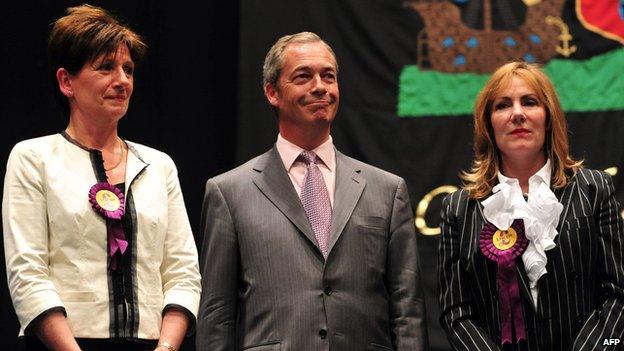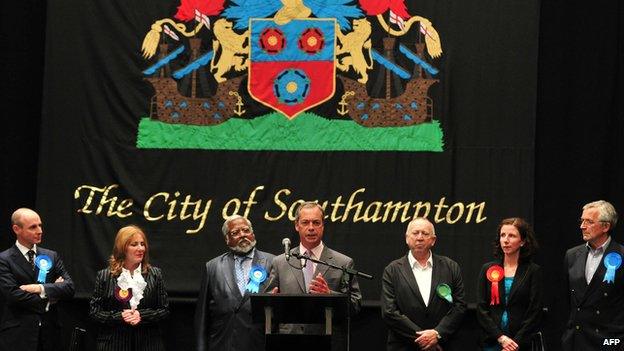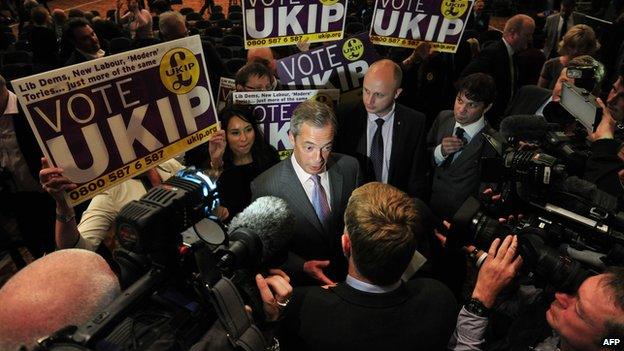UKIP looks to Westminster after Euro win
- Published

Diane James (l) and Janice Atkinson were elected along with Nigel Farage in the South East region
UKIP has set its sights on Westminster after recording a resounding victory in the European elections.
Nigel Farage pledged: "You've not heard the last of us," calling the result the most extraordinary for a century.
His party came first in six of the 10 regions to declare, with its strongest performance in the East Midlands.
The electoral "earthquake" Mr Farage had predicted came as radical, anti-EU parties on the right and left topped polls across Europe.
UKIP is on course to win its first seat in Scotland, although the confirmed result is not due until later.
But it finished third in London where it polled almost 10% lower than in the country as a whole.
'Cast-iron guarantee'
Mr Farage put the party's success down to voters' "very strong desire" to have a "different relationship with Europe".
He told reporters: "The message is people have had enough of not being told the truth and not being given the opportunity to express their opinion.
"Five years ago the Conservatives won, giving us a cast-iron guarantee of a referendum they didn't deliver."

Giving his victory speech in Southampton the UKIP leader said the party's "people's army" would now move on to Newark where it is locked in a by-election battle with the Conservatives.
Voters in the Nottinghamshire constituency are set to decide who will replace disgraced Tory MP Patrick Mercer on 5 June.
UKIP's candidate in the poll and re-elected MEP Roger Helmer said he had an "excellent chance" of causing an upset.
"It depends on the voters of Newark," said Mr Helmer, who came first in the East Midlands region.
"They have to make their choice but I think we have set out tonight reasons why they should make this statement on behalf of Britain."
Scottish support
Mr Farage admitted the party's hopes were limited but added: "I am not writing it off."
In Thursday's European election his anti-EU party beat the Conservatives into second place in the Newark and Sherwood District Council area.

"We will go on next year to the general election with a targeting strategy," Mr Farage told jubilant supporters at the count in Southampton.
"And I promise you this - you haven't heard the last of us."
In Scotland, where UKIP looks like it will secure the party's first seat, would-be MEP David Coburn said: "With this level of support, UKIP would win significant representation at Holyrood and at Westminster."
Attack on papers
People cast their votes across the UK on Thursday to elect 73 MEPs in 12 separate regional constituencies.
UKIP led Labour in some opinion polls ahead of polling day, but by margins too close to call.
The Conservatives topped the poll five years ago and UKIP, with 16.5%, came just ahead of Labour on 15.7%.
But with only Scotland left to declare UKIP is set to go one better this year, topping the poll with a projected 24 MEPs and 28% of the vote.
In other developments:
Labour topped the poll in Wales, the North-West of England, the North-East of England and London where it increased its share of the vote by 15% to 36.7%
Ed Miliband's party has 18 MEPs so far, an increase of seven on 2009, which was a record low point for the party
The Conservatives have so far secured 24% of the vote nationally and lost seven seats
The Lib Dems have lost nine MEPs but avoided a humiliating wipe-out by winning a single seat in the South-East of England
The Green Party has got three MEPs - one more than it achieved in 2009
There were two sets of elections on Thursday. The results of the local elections in England and Northern Ireland are already known.
Coverage is on the BBC News Channel and BBC World. You can follow all the latest news, reaction and results on bbc.co.uk/vote2014
UKIP gained 161 council seats in the English local elections but its vote share was down on the previous year.
Its spin doctor Patrick O'Flynn, an ex-newspaper correspondent, was elected as an MEP in the Eastern region.
He hit back at the press for its attacks on the party during the campaign.
"We have a right to claim we are somewhat closer to their readers than some of those newspapers," he said.